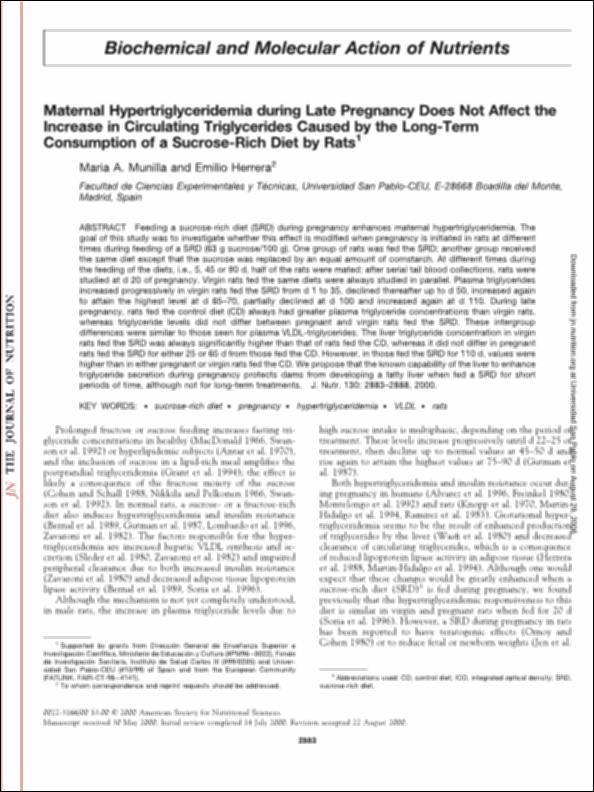Please use this identifier to cite or link to this item:
http://hdl.handle.net/10637/935Maternal hypertriglyceridemia during late pregnancy is not added to the increase in circulating triglycerides caused by long-term feeding a sucrose-rich diet in the rat.
| Title: | Maternal hypertriglyceridemia during late pregnancy is not added to the increase in circulating triglycerides caused by long-term feeding a sucrose-rich diet in the rat. |
| Authors : | Munilla Suárez, María Ángeles Herrera Castillón, Emilio. |
| Keywords: | Sucrose-rich diet.; Pregnancy.; Hypertriglyceridemia.; VLDL. |
| Abstract: | Feeding a sucrose-rich diet (SRD) during pregnancy enhances maternal hypertriglyceridemia. The goal of this study was to investigate whether this effect is modified when pregnancy is initiated in rats at different times during feeding of a SRD (63 g sucrose/100 g). One group of rats was fed the SRD; another group received the same diet except that the sucrose was replaced by an equal amount of cornstarch. At different times during the feeding of the diets, i.e., 5, 45 or 90 d, half of the rats were mated; after serial tail blood collections, rats were studied at d 20 of pregnancy. Virgin rats fed the same diets were always studied in parallel. Plasma triglycerides increased progressively in virgin rats fed the SRD from d 1 to 35, declined thereafter up to d 50, increased again to attain the highest level at d 65–70, partially declined at d 100 and increased again at d 110. During late pregnancy, rats fed the control diet (CD) always had greater plasma triglyceride concentrations than virgin rats, whereas triglyceride levels did not differ between pregnant and virgin rats fed the SRD. These intergroup differences were similar to those seen for plasma VLDL-triglycerides. The liver triglyceride concentration in virgin rats fed the SRD was always significantly higher than that of rats fed the CD, whereas it did not differ in pregnant rats fed the SRD for either 25 or 65 d from those fed the CD. However, in those fed the SRD for 110 d, values were higher than in either pregnant or virgin rats fed the CD. We propose that the known capability of the liver to enhance triglyceride secretion during pregnancy protects dams from developing a fatty liver when fed a SRD for short periods of time, although not for long-term treatments. |
| Description: | En: Journal of Nutrition. 2000. n. 130 : 2883-2888 p. 0022-3166 |
| URI: | http://hdl.handle.net/10637/935 |
| Rights : | http://creativecommons.org/licenses/by-nc-nd/4.0/deed.es |
| Issue Date: | 19-Sep-2000 |
| Center : | Universidad San Pablo-CEU |
| Appears in Collections: | Facultad de Farmacia |
Items in DSpace are protected by copyright, with all rights reserved, unless otherwise indicated.


